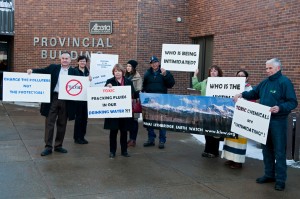 By Kimlee Wong
By Kimlee Wong
APTN National News
Cardston, AB
Three Kainai women from the Blood reserve in southern Alberta appeared in Cardston provincial court on Dec. 21 after being arrested by Blood Tribe police and charged with “intimidation” for blocking the highway.
Lois Frank, Elle-Maija Apiniskim Tailfeathers and Jill Crop Eared Wolf are members of a group called the Kainai Earth Watch.
The charges came as a result of a Sept. 9 non-violent protest against hydraulic fracking on their lands. The women stood in front of Murphy Oil company trucks, refusing to let the trucks leave an oil well site on the reserve.
Hydraulic fracking is a process used to remove natural gas from the earth. First an oil well is dug, then millions of litres of water, sand and chemicals are injected deep into the earth at high pressure. The injection creates cracks in the earth from which the natural gas can be more easily collected.
Critics of fracking say it wastes millions of litres of fresh water, has contaminated entire aquifers, uses chemicals linked to severe adverse health effects such as cancer, and creates large amounts of toxic wastewater that is released back into fresh water sources or stored in sewage ponds.
There are also concerns that there is increased earthquake activity in areas where fracking is happening.
Canada has no national water strategy. Fracking is currently not regulated in Canada.
Environmental regulations on reserve are less comprehensive than Canadian standards. Former Auditor General Sheila Fraser in her 2011 update, warned that it will take a lot of time for First Nation standards to be improved to meet the standards other Canadians take for granted.
“First Nation reserves may still be years away from having drinking water protection comparable to what exists off-reserve in Canada,” Fraser wrote.
In 2010, the Blood Tribe chief and council signed a five-year lease agreement with two oil and gas companies, Murphy Oil and Bowood Energy, giving them drilling rights to roughly half of the community’s land base.
The women who were arrested say the community never had a say in the agreement.
Jim Gladstone is one of two Blood Tribe councillors who do not support the five-year lease agreement. He didn’t sign it. He says while he is not against oil exploration, he wants it regulated.
Gladstone also said that the agreement fails to put in place any monitoring or studies into what effects fracking will have on his community.
Lois Frank, one of the Blood women charged, told APTN National News she remains confident in the legal position she has taken. She believes the government of Canada has a legal obligation to protect “Indians and Indian lands” and would like to see a government representative in court doing that.
Ingrid Hess is a lawyer for two of the women charged. Elle-Maija Apiniskim Tailfeathers and Jill Crop Eared Wolf are students and don’t believe the oil companies’ licences are valid under Aboriginal law. They say lack of community consultation and disclosure of the details of the contracts means their right to consultation wasn’t fulfilled.
“In order to enforce their rights to have their lands protected and have their concerns heard, my clients feel they not only have a right but a duty to do what they are doing,” Hess said.
Hess has requested copies of the contracts which the oil companies say gives them a right to operate on Blood territory but so far she has not seen those documents.
Frank is upset that NDP Aboriginal Affairs Critic Linda Duncan’s questions in the House of Commons about fracking on reserves on Dec. 11 were answered by the Environment minister who referred it to the province of Alberta. She wants the federal minister of Aboriginal Affairs to weigh in on the issue.
A grandmother of seven and a former University of Lethbridge lecturer, Frank said she believes fracking is already damaging the land and she is worried about her community’s well-being. She said the two earthquakes listed by Natural Resources Canada on Dec. 5 were in the area of the oil and gas well where she and the other women were arrested. She also believes that the Dec. 8 closing of the community school due to strong gas smells and sickness in the children are also related to the fracking.
“I’m not the one who should be in court, it should be the oil companies,” said Frank.
As evidence that her concerns are justified, she points to the growing list of communities who are declaring moratoriums on fracking until more studies have been done and an U.S. Environmental Protection Agency study that found water contamination from fracking to be a cause of serious concern.
First Nations leaders have long complained that when accidents do happen on or near their lands, it’s their communities, not the companies, that are stuck with the tab and the adverse health effects.
Frank said she understands the difficult position chiefs are in as they try to provide for their communities in a system of chronic under-funding, but feels that the strength of their people and community can only come by protecting the integrity of the lands and waters.
The three women have some high profile supporters. Maude Barlow of the Council of Canadians has visited the community and given the women her organization’s full support, including a contribution to their legal defense. Climate change advocate Bill McKibben and film director Josh Fox have also made statements in support of the women.
Calls to Chief Charles Weasel Head of the Blood Tribe and Murphy Oil seeking comment were not returned.









